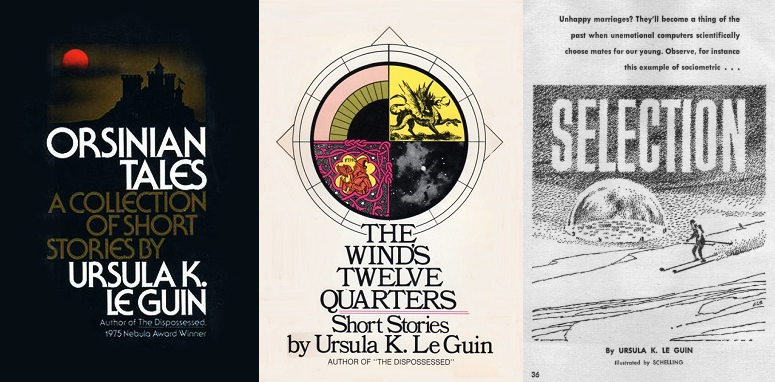
I had been meaning to read Ursula K. Le Guin for a long time, and the shutdown of Cohost was what finally pushed me to try out "The Ones Who Walk Away from Omelas". I'm sorry if you're disappointed that that's what got me to do it, or that I hadn't read it before, or whatever, but at least I finally did. It's been a little bit since I read any books, and longer since I wrote about them, and it feels nice to be back.
The stories here were collected in Orsinian Tales and The Wind's Twelve Quarters, except for "Selection", which has not been included in any collections whatsoever.
"The Ones Who Walk Away from Omelas"
I always feel pressure and anxiety when writing about something as well-known as this, that has been analyzed and discussed for decades. What the hell could I say that hasn't been said before by countless people who are much smarter and more well read than me, that doesn't feel either shallow and obvious, or shallow and obviously wrong? Nothing.
I did like it a lot. The premise of the utopian city depending on suffering; and the deliberately vague narrator asking you to paint a mental picture of the city, giving you just enough details to make your own Omelas vivid to you, while building up to the core, and asking you why you think a society not depending on suffering is unbelievable.
After reading it, I felt determined to read the rest of Le Guin's works - and because this is the kind of person I am, I wanted to do it chronologically from the beginning. Again, sorry if this approach upsets you, but this is how I do things.
"An die Musik"
This one is okay, but was honestly kind of forgettable and plain, and it did not do a lot with the "imaginary European country" Orsinia setting - I do not think it's a coincidence that it, despite being published first, is printed in the back half of the Orsinian Tales short story collection. Hopefully future Orsinian stories have more to offer.
"April in Paris"
This story is charming and sweet when focusing on the growing friendship between the two lonely men, and is often quite funny. At the same time, it feels underdeveloped - it ends very suddenly, just as I felt it was starting to get going - and its portrayal of the two women feels flat and sexist.
"The Masters"
The third of Le Guin's published works, and the first of these to have a captivating setting and a good sense of place. I love how it starts in literal darkness, and gradually opens up as the nature of the setting becomes clearer, and the reason for the laws limiting mathematics and science. I kind of wanted to read more in this setting, but I simultaneously think it covered everything it needed to and left off at the right place.
"Darkness Box"
The concepts of time halted through the box, and of darkness sealed within it, are cool, and the writing is engaging, but it kind of lost me at a few points, and not in a way that seemed intentional or like it added something. Still, I enjoyed it. Maybe I should re-read it.
"The Word of Unbinding"
Love this - it did a great job at making you feel the wizard's different states of being on a sensory and emotional plane. Apparently, this is the first Earthsea story, although I will say that it did not particularly give me much of an idea of what that setting is like (which isn't a problem, this is its own story first).
"The Rule of Names"
This one had a great sense of place, and a nice "children's story" feeling to it, without feeling shallow, not entirely unlike early parts of The Fellowship of the Ring or the Tiffany Aching books in tone. Got me excited to read more of Earthsea.
"Selection"
I had to get a scan of its original magazine publication to read it, and yeah, I can see why Le Guin didn't want to include this in her short story collections. The kind of funny but predictable ending was the only part of this that I sort of enjoyed - the arranged-marriage-leading-to-true-love plot felt trite, and I didn't care about any of the characters.
And next:
Next in the chronology is the 1964 short story "Semley's Necklace", originally released as "The Dowry of Angyar", which was re-published in 1966 as the prologue to Le Guin's first published novel, Rocannon's World. The novel is just a bit over 100 pages, as are the next two, which all are part of a series, so I'll most likely cover all three of those in a single writeup.